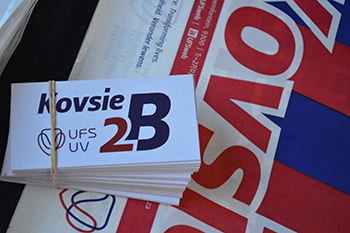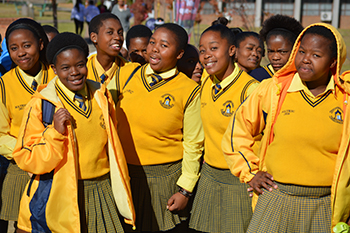Latest News Archive
Please select Category, Year, and then Month to display items
02 January 2025
|
Story Gerda-Marie van Rooyen
|
Photo Supplied
 Leading the research in South Africa is Prof Linus Franke from the Department of Soil, Crop and Climate Sciences.
Leading the research in South Africa is Prof Linus Franke from the Department of Soil, Crop and Climate Sciences.
Scientists are actively pursuing the successful breeding of diploid hybrid potatoes from inbred lines. This is expected to revolutionise potato breeding as it holds the key to rapid genetic progress. It will introduce new varieties for commercialisation through seed. Currently, existing potato variants have a gene that renders self-pollinated seeds infertile.
Prof Linus Franke, an academic in the Department of Soil, Crop and Climate Sciences at the UFS, is leading the research in South Africa. “This technology allows the production of genetically uniform potato seed that is easy to transport and largely disease-free.” He says this differs from conventional breeding whereby only vegetative propagation is possible due to tetraploid varieties in potatoes. It also risks carrying pests and diseases from one generation to the next – leading to the accumulation of pests and diseases with each round of multiplication.
Seed innovation
Prof Franke explains that Solynta BV, a seed company based in the Netherlands that produces potato varieties that can be grown from seed, has included South Africa in their research efforts because it is one of Africa’s largest producers and exporters. Through his academic relationship with Wageningen University and Research, a Dutch institution renowned for its agricultural endeavours and food production, the UFS became involved in researching hybrid potatoes grown from seed.
Diploid seeds containing two sets of chromosomes allow easier gene manipulation to increase predictability and speedier genetic progress. The breeding approach enables the incorporation of tolerance to pests, diseases, abiotic stresses (cold, heat, drought) and other desired genetic traits.
Although Prof Franke is optimistic about this research, he is not blind to disadvantages. “Potato seeds are tiny and have little energy reserves, making it harder to grow potatoes from seed than from tubers.” He says potatoes from seed will take longer to cultivate than tubers, as farmers need to grow plantlets from seeds first, adding six weeks to the growing period. “It is possible that commercial farmers can grow potatoes directly from seed. Alternatively, perhaps more likely, specialised growers will produce tubers of potatoes from seed; these tubers are then sold as seed tubers to other potato farmers, who then continue their normal practices of producing potatoes for the market from tubers.”
Financial benefits
Prof Franke says farmers have reason to get excited. “Seed potatoes will reduce input costs, as varieties with enhanced tolerance to pests and diseases require less pesticides. Planting one hectare of potatoes requires three to four tonnes of potato tubers, but only one 25 g packet of potato seeds.” Since potatoes are a more valuable commodity than maize, this technology might also increase farmers’ income potential.
Future Kovsies explore Qwaqwa Campus
2017-05-26


Learners from Molapo Secondary School in
Makoane, Qwaqwa, during Open Day.
Photo: Thabo Kessah
AMAZING! This is just one of the words used by prospective Kovsies to describe their experience, when thousands of learners visited the Qwaqwa Campus for this year’s Open Day on Saturday 20 May 2017.
“Spending time on campus and learning what the university offers even beyond academics was such an amazing experience,” said a prospective Political Studies and Governance student, Kamohelo Mofokeng from Bluegumbosch Secondary School in Qwaqwa.
“We explored both academic and support services, and getting to see and listen to motivating words from eTV stars was unforgettable,” she added. “The event was informative and many of our learners even managed to apply online using university facilities,” said Modiehi Masita, Life Orientation teacher at Tsebo Secondary School in Boiketlo, Qwaqwa.
First step in the right direction
Talking to learners, Campus Principal Prof Prakash Naidoo said their visit was the first step in the right direction.
“This is the first step towards attaining your dream qualification. You have to work hard to build yourself a career, and not aspire to be what is commonly known as a tenderpreneur,” he said. “You have come to this campus when men need to stand up and not bury their heads in the sand, as we are faced with abuse and killings of women and children. We must all stand up to abuse,” he said under resounding appreciation from learners and their teachers.
Also talking to the learners were TV stars from eTv’s Rhythm City and Scandal.
I can and I will make it
‘I can and I will make it’ led by Mapula Mafole was adopted as the war cry towards the examinations and success in life for the class of 2017. Mafole plays the role of Mapula in the TV series Rhythm City. She was accompanied by Ishmael Sango and Nkosi Cengane, who respectively play Sabelo and Emmanuel in Rhythm City, and Mbulelo Katise who plays Scelo in Scandal.
Qwaqwa Campus alumnus and hip-hop artist, TactixSA, provided entertainment.